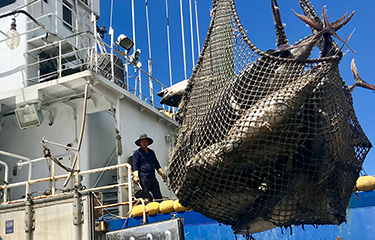Bumble Bee Foods and FCF Co. have teamed up with Ocean Outcomes to improve the sustainability of Bumble Bee source fisheries in the Indian Ocean via a fisheries improvement project (FIP), with an end goal of certification.
Presently, there are no certified albacore tuna or longline fisheries in the Indian Ocean.
Vessels that will participate in this FIP catch approximately 6,000 metric tons of albacore tuna annually from the Indian Ocean, with much of the catch being processed in Mauritius and exported to North American markets for canning.
“We are very excited to formally launch our FIP in the Indian Ocean, expanding the work we have initiated in the Pacific,” Bumble Bee Seafood Vice President of Global Sustainability and Social Responsibility Mike Kraft said. “This Indian Ocean FIP will work to improve the sustainability of yet another major source of the albacore used in Bumble Bee’s products.”
Over the next few years, the project will focus on improving fishery data collection, reporting mechanisms, and monitoring tools and management strategies with the objective of improving practices on Chinese Taipei longline tuna fishing vessels to make the fishery certifiable within five years.
One major step forward for the fishery will be to increase electronic observer coverage on the fishing vessels. While there is some existing coverage in the fleet, the FIP has a goal of 100 percent coverage. In the initial phase of the project, generating better fishery data will be the focus. That data will then be used to inform science-based management for the target albacore stock and bycatch species.
“Projects such as this offer a transparent, step-wise approach for fishers to move towards sustainability, which is sorely needed in the Indian Ocean. We’re proud to work with the industry to reduce the negative impacts of fishing and to address the challenges of longline fisheries,” Ocean Outcomes Vice President of Strategy and Impact Daniel Suddaby said.
Along with this new FIP, Bumble Bee, FCF, and O2 have a similar project focused on ensuring sustainable Chinese Taipei longline vessels in the Western and Central Pacific Ocean. It is hoped that these efforts can serve as a catalyst for tuna fisheries in the region to support the development of science-based management strategies and improve the assured supply of albacore species.
The projects will work with partners like International Seafood Sustainability Foundation (ISSF) to achieve certifiable status by 2024.
Photo courtesy of Bumble Bee/Ocean Outcomes/FCF







